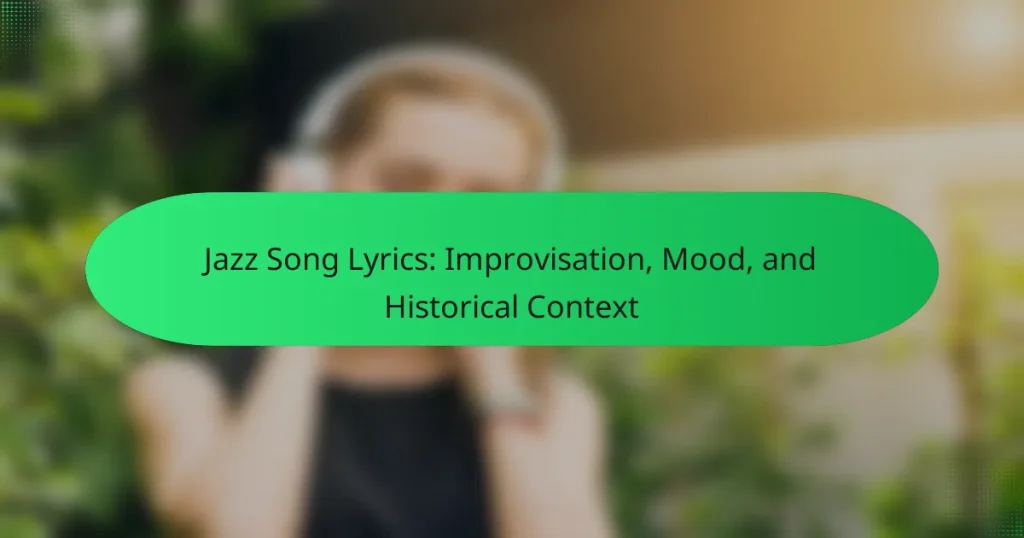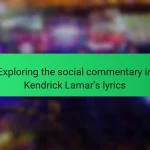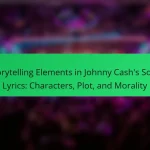Jazz song lyrics are a crucial component of jazz music, serving as a medium for emotional expression and storytelling. These lyrics reflect the improvisational nature of the genre and often explore themes such as love, struggle, and social commentary. The article examines the significance of jazz song lyrics, highlighting their ability to evoke emotions and address cultural narratives. It also discusses methods for analyzing these lyrics, focusing on thematic elements, language, and historical context. By engaging with the music and understanding its background, listeners can enhance their appreciation of the intricate relationship between jazz lyrics and the overall musical experience.
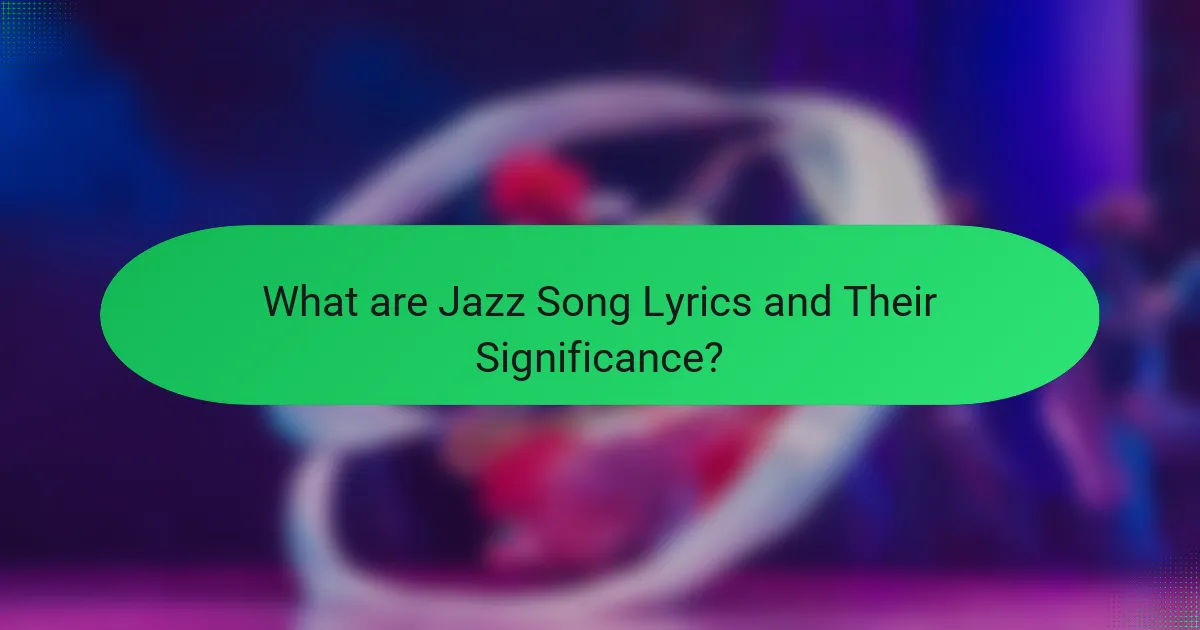
What are Jazz Song Lyrics and Their Significance?
Jazz song lyrics are the textual component of jazz music that often convey emotions and stories. They serve as a medium for expression, reflecting the improvisational nature of jazz. These lyrics can vary widely in style and theme, often drawing from personal experiences or cultural narratives.
The significance of jazz song lyrics lies in their ability to enhance the listener’s emotional experience. They can evoke feelings of joy, sorrow, or nostalgia. Historically, jazz lyrics have also played a role in social commentary, addressing issues such as race and inequality.
Notable examples include works by artists like Billie Holiday and Louis Armstrong, whose lyrics often encapsulated the struggles and triumphs of their time. The combination of melody and lyrics creates a unique storytelling experience that is central to the jazz genre.
How do Jazz Song Lyrics differ from other musical genres?
Jazz song lyrics differ from other musical genres in their emphasis on improvisation and emotional expression. The lyrics often reflect spontaneous creativity, allowing artists to convey feelings in real-time. Unlike pop or rock, where lyrics may follow strict structures, jazz lyrics prioritize mood and atmosphere. Historical context plays a significant role in jazz, often referencing cultural experiences and social commentary. This unique approach makes jazz lyrics a vehicle for personal storytelling and artistic freedom, distinguishing them from more formulaic lyrical styles.
What unique characteristics define Jazz Song Lyrics?
Jazz song lyrics are characterized by their improvisational nature, emotional depth, and cultural context. These lyrics often reflect spontaneous creativity, allowing for personal expression and variation in performance. They frequently incorporate themes of love, struggle, and social issues, mirroring the historical experiences of African American communities. The use of colloquial language and slang adds authenticity and relatability to the lyrics. Rhythmic patterns in jazz lyrics often align with the music, enhancing the overall performance. Additionally, jazz lyrics may include call-and-response elements, engaging the audience and creating a dynamic interaction. This unique blend of attributes distinguishes jazz lyrics from other musical genres.
How do improvisation and spontaneity influence Jazz Song Lyrics?
Improvisation and spontaneity significantly influence jazz song lyrics by allowing artists to express emotions and ideas in real-time. Jazz musicians often create lyrics on the spot, reflecting their immediate feelings and experiences. This practice leads to a dynamic and fluid lyrical structure that can change with each performance. The unpredictability of improvisation fosters creativity, encouraging artists to explore new themes and narratives. Spontaneous lyricism often incorporates colloquial language and personal anecdotes, making the music relatable. Historical contexts, such as the Harlem Renaissance, further shaped this improvisational style, emphasizing personal expression. Consequently, jazz lyrics become a living art form, evolving with each rendition.
Why is mood important in Jazz Song Lyrics?
Mood is crucial in jazz song lyrics because it shapes the emotional experience of the music. Jazz often relies on improvisation, which can be influenced by the mood conveyed in the lyrics. The mood can evoke feelings of joy, sadness, or nostalgia, enhancing the listener’s connection to the performance. Historically, jazz lyrics have reflected the cultural and social contexts of their time, further emphasizing the importance of mood. For instance, songs from the blues tradition often express deep emotional struggles, while swing-era lyrics might convey a sense of celebration. The interplay between mood and music in jazz creates a dynamic listening experience that resonates with audiences.
How do different moods manifest in Jazz Song Lyrics?
Different moods manifest in jazz song lyrics through thematic content, emotional expression, and stylistic choices. Lyrics often reflect feelings such as joy, sorrow, or nostalgia. For instance, upbeat melodies paired with lyrics about love convey happiness. Conversely, slower tempos and melancholic lyrics often express sadness or longing. The use of metaphors and imagery enhances emotional depth. Jazz artists like Billie Holiday and Duke Ellington exemplify this, with lyrics that capture complex emotional landscapes. The historical context of jazz also influences mood, as socio-political themes often emerge in the lyrics. This interplay of mood and lyrical content is foundational to jazz’s expressive nature.
What techniques do lyricists use to convey mood in Jazz?
Lyricists in jazz use techniques such as imagery, metaphor, and emotional language to convey mood. Imagery creates vivid pictures that evoke specific feelings. For instance, describing a rainy night can evoke sadness or nostalgia. Metaphors connect emotions to relatable concepts, deepening the listener’s experience. Emotional language, including expressive words and phrases, enhances the overall sentiment of the lyrics. These techniques are often supported by the music’s rhythm and melody, which complement the lyrical mood. Historical context also influences mood, as lyrics often reflect the social and cultural environment of their time. This interplay between lyrics and music is essential in jazz, making the emotional impact profound.
What historical context shapes Jazz Song Lyrics?
Jazz song lyrics are shaped by a rich historical context that includes cultural, social, and political influences. The origins of jazz in the early 20th century reflect African American experiences. These experiences include struggles with racism and the quest for identity. The Great Migration saw many African Americans move to urban areas, influencing jazz themes. The Harlem Renaissance celebrated black culture and arts, impacting lyrical content. Additionally, Prohibition and the Jazz Age brought new social dynamics, influencing lyrical narratives. World events, such as the Great Depression and World War II, also shaped themes of resilience and hope. Overall, historical events and cultural shifts significantly inform the content and mood of jazz lyrics.
How did the cultural background influence the evolution of Jazz lyrics?
Cultural background significantly influenced the evolution of Jazz lyrics. African American experiences shaped the themes and emotions expressed in the lyrics. The struggles of slavery and segregation are reflected in the sorrowful and poignant lyrics of early Jazz. Additionally, the Harlem Renaissance introduced a cultural flourishing that inspired more complex and varied lyrical content. Jazz lyrics often incorporated elements of storytelling, drawing from oral traditions. The influence of blues music infused Jazz lyrics with themes of heartache and resilience. Over time, the incorporation of diverse cultural elements enriched the lyrical landscape. This evolution highlights the dynamic interplay between cultural identity and musical expression in Jazz.
What role did significant historical events play in Jazz lyricism?
Significant historical events profoundly influenced jazz lyricism. Events such as the Great Migration shaped themes of struggle and resilience in lyrics. The Civil Rights Movement inspired songs that addressed social justice and equality. World War II introduced feelings of loss and nostalgia, reflected in many jazz compositions. The Harlem Renaissance brought a focus on African American culture and identity, enriching lyrical content. Economic hardships during the Great Depression led to expressions of hardship and hope in lyrics. Each of these events provided context that shaped the emotional and thematic depth of jazz lyrics.
How do improvisation techniques enhance Jazz Song Lyrics?
Improvisation techniques enhance jazz song lyrics by allowing for spontaneous expression and creativity. This fluidity encourages lyricists to explore new themes and emotions in real-time. Improvisation fosters a unique connection between the performer and the audience. It creates an unpredictable and dynamic experience that keeps listeners engaged. Historical examples, such as the works of Billie Holiday and Louis Armstrong, showcase how improvisation shaped lyrical content. Their performances often included ad-libbed phrases that added depth to the lyrics. This practice enriches the storytelling aspect of jazz, making it more relatable and impactful. Overall, improvisation techniques serve as a catalyst for innovation in jazz lyrics.
What are the key improvisational strategies used in Jazz lyrics?
Key improvisational strategies used in Jazz lyrics include call and response, syncopation, and melodic variation. Call and response involves a dialogue between the vocalist and instrumentalists. This technique creates a dynamic interaction that enhances the performance. Syncopation emphasizes off-beats, adding rhythmic complexity to the lyrics. This strategy engages the audience and maintains interest. Melodic variation allows singers to alter melodies, showcasing their creativity. Artists often embellish or modify existing melodies to express personal style. These strategies contribute to the spontaneity and expressiveness characteristic of Jazz music. Historical context shows that these techniques evolved from African musical traditions, influencing modern Jazz lyricism.
How do musicians and lyricists collaborate during improvisation?
Musicians and lyricists collaborate during improvisation by engaging in spontaneous interaction. This process involves musicians creating melodies and rhythms while lyricists generate lyrics in real-time. They often rely on cues from each other’s performance. For instance, a musician may play a particular chord progression, prompting the lyricist to respond with relevant lines. This back-and-forth exchange fosters creativity and enhances the performance. Studies show that successful improvisation requires active listening and adaptability from both parties. In jazz, this collaborative approach is essential for creating dynamic and expressive pieces.
What are the common themes found in Jazz Song Lyrics?
Common themes found in jazz song lyrics include love, heartache, and social issues. Love is often depicted with deep emotion and longing. Heartache frequently explores loss and nostalgia. Social issues reflect struggles against racism and inequality. These themes resonate with the historical context of jazz music. Many jazz songs emerged during the Civil Rights Movement. The improvisational nature of jazz allows for personal expression of these themes. Lyrics often convey a sense of freedom and spontaneity. This connection to real-life experiences enhances the authenticity of jazz music.
How do personal experiences shape the themes in Jazz lyrics?
Personal experiences significantly shape the themes in Jazz lyrics. Jazz musicians often draw from their life stories, emotions, and cultural backgrounds. This personal connection infuses authenticity into the lyrics. For example, the struggles of African American communities during the Civil Rights Movement are prevalent in many Jazz songs. Artists like Billie Holiday in “Strange Fruit” address racial injustice through deeply personal narratives. Additionally, themes of love, loss, and resilience are commonly explored, reflecting individual experiences. The improvisational nature of Jazz allows artists to express these themes spontaneously, making each performance unique. Overall, personal experiences serve as a rich foundation for the thematic depth in Jazz lyrics.
What social issues are often addressed in Jazz Song Lyrics?
Jazz song lyrics often address social issues such as racism, poverty, and love. These themes reflect the historical context of jazz music. Racism is a prevalent issue, often highlighted in songs that express the struggles of African Americans. For instance, “Strange Fruit” by Billie Holiday poignantly addresses racial violence. Poverty is another common theme, depicted in lyrics that narrate the hardships of urban life. Songs like “Ain’t Misbehavin'” reveal the emotional toll of economic struggles. Love, both its joys and pains, is frequently explored in jazz, showcasing personal relationships against societal backdrops. This blend of social commentary and personal narrative makes jazz lyrics impactful.
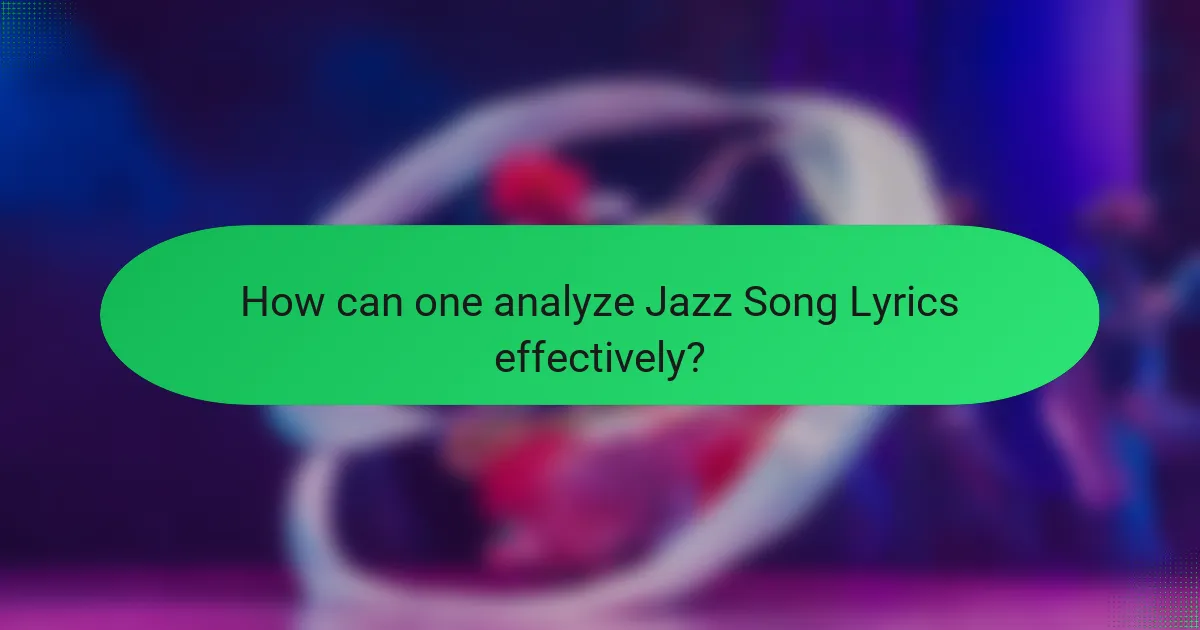
How can one analyze Jazz Song Lyrics effectively?
To analyze jazz song lyrics effectively, one should focus on thematic elements, language, and historical context. Start by identifying the main themes present in the lyrics. Common themes in jazz include love, struggle, and social commentary. Next, examine the language used in the lyrics. Look for figurative language, metaphors, and imagery that convey deeper meanings.
Consider the emotional tone conveyed through word choice and phrasing. Analyze how the lyrics reflect the improvisational nature of jazz music. This often involves understanding how lyrics interact with musical elements such as rhythm and melody.
Historical context is crucial for understanding the significance of the lyrics. Research the time period when the song was written and the social issues that influenced its creation. This background can provide insight into the artist’s intentions and the song’s impact.
Listening to the song while reading the lyrics can enhance understanding. This allows for a better grasp of how the music complements the lyrical content. Engaging with multiple interpretations can also deepen analysis, as jazz often invites diverse perspectives.
What methods can be used to interpret Jazz Song Lyrics?
Methods to interpret jazz song lyrics include analyzing lyrical themes, understanding historical context, and exploring improvisational elements. Lyrical themes often reflect personal experiences, societal issues, or emotional states. Historical context provides insight into the era and cultural influences affecting the music. Improvisational elements highlight how musicians may alter lyrics or melodies during performances. These methods enhance comprehension of the song’s message and emotional depth.
How can lyrical analysis deepen the understanding of Jazz music?
Lyrical analysis can deepen the understanding of Jazz music by revealing the themes and emotions expressed in the lyrics. Jazz often reflects personal and social experiences, which lyrics encapsulate. Analyzing lyrics provides insights into the cultural and historical contexts of the music. For instance, many Jazz songs address themes of love, struggle, and resilience. This thematic exploration enhances appreciation for the artistry involved in Jazz composition. Furthermore, lyrics often complement the improvisational aspects of Jazz, showcasing how vocal delivery influences mood and interpretation. Understanding these elements allows listeners to connect more deeply with the music and its origins.
What resources are available for studying Jazz Song Lyrics?
Resources for studying jazz song lyrics include academic journals, books, and online databases. Scholarly articles in musicology often analyze lyrics in detail. Books like “The Jazz Standards” by Ted Gioia provide context and interpretations. Online platforms such as JSTOR and Google Scholar offer access to research papers on jazz lyrics. Websites dedicated to jazz music, like JazzTimes and All About Jazz, feature articles and discussions on lyric themes. Additionally, lyric databases such as Genius provide annotated lyrics and user commentary. These resources collectively enhance the understanding of jazz lyrics within their cultural and historical contexts.
Which books or articles provide insights into Jazz lyricism?
Books and articles that provide insights into Jazz lyricism include “The Jazz Standards” by Ted Gioia. This book offers detailed analysis of classic jazz songs and their lyrics. Another key resource is “The Language of Jazz: A Study of Jazz Lyrics” by David Ake. It examines the interplay between jazz music and its lyrical content. Additionally, “Jazz Lyrics: A Guide to the Best” by David Ewen highlights influential jazz lyricists and their contributions. The article “Jazz and the Poetics of Improvisation” by John Szwed discusses the improvisational aspects of jazz lyrics. Each of these works contributes to understanding the depth of jazz lyricism within its historical and cultural context.
What online platforms offer analysis and discussions on Jazz lyrics?
Genius, AllMusic, and SongMeanings are online platforms that offer analysis and discussions on jazz lyrics. Genius provides user-generated annotations and interpretations of lyrics. AllMusic features reviews and insights into jazz songs and their lyrical content. SongMeanings allows users to discuss and interpret the meanings behind various song lyrics, including those in jazz. Each platform encourages community engagement and exploration of lyrical themes in jazz music.
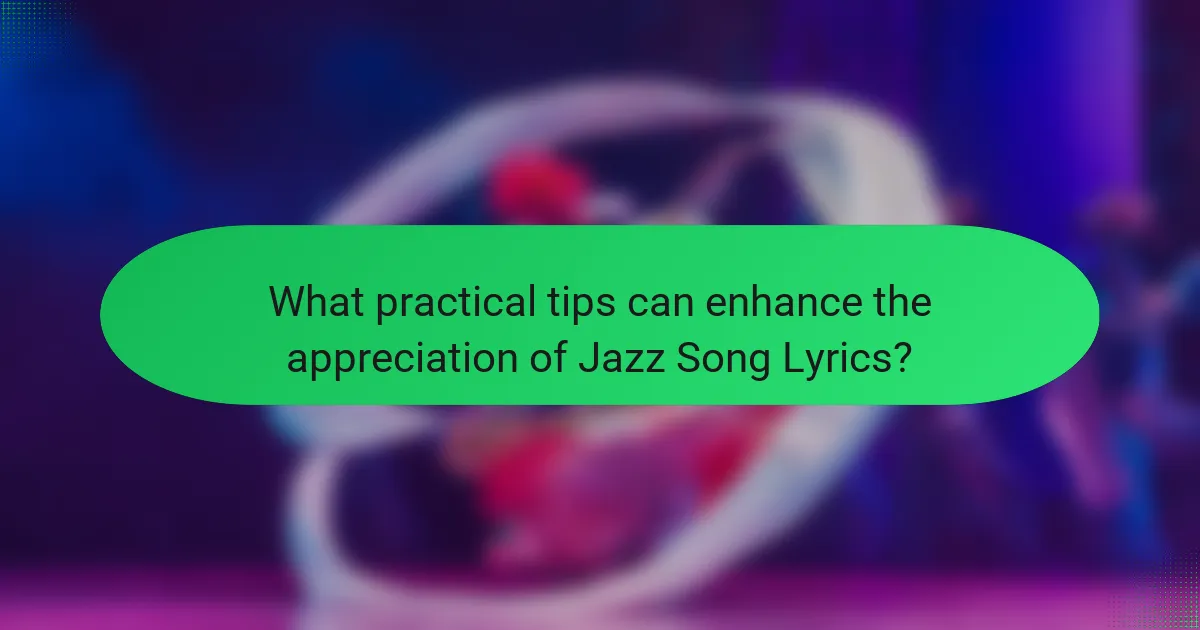
What practical tips can enhance the appreciation of Jazz Song Lyrics?
To enhance the appreciation of jazz song lyrics, actively listen to the music while reading the lyrics. This approach allows for a deeper understanding of the emotional context. Familiarize yourself with the historical background of jazz to grasp cultural influences on the lyrics. Study the improvisational techniques used by artists, as they often reflect personal expression within the lyrics. Analyze the lyrical themes, such as love, struggle, and joy, to connect with the underlying messages. Attend live jazz performances to experience the energy and spontaneity of the genre. Engage in discussions with other jazz enthusiasts to gain diverse perspectives on the lyrics. Use resources like lyric annotations to uncover meanings and interpretations.
How can listeners engage more deeply with Jazz Song Lyrics?
Listeners can engage more deeply with jazz song lyrics by analyzing the themes and emotions conveyed. Understanding the historical context of the lyrics enhances appreciation. Listening to the musical improvisation alongside the lyrics creates a richer experience. Exploring the artist’s background and influences provides insight into their lyrical choices. Engaging with the lyrics through active listening promotes connection and interpretation. Reading and studying the lyrics can reveal hidden meanings and nuances. Participating in discussions or forums about the lyrics fosters a deeper understanding. Overall, these methods encourage a more profound engagement with jazz song lyrics.
What practices can improve one’s understanding of Jazz improvisation?
Listening to a variety of jazz recordings can improve one’s understanding of jazz improvisation. Exposure to different styles and artists enhances musical vocabulary. Practicing scales and modes is essential for developing technical skills. This builds a foundation for improvisational creativity. Transcribing solos from renowned jazz musicians deepens comprehension of improvisational techniques. Analyzing chord progressions helps in understanding harmonic structures. Participating in jam sessions fosters real-time improvisation experience. Collaborating with other musicians encourages the exchange of ideas and styles. These practices collectively enhance one’s grasp of jazz improvisation.
How can one develop a personal connection with Jazz lyrics?
To develop a personal connection with Jazz lyrics, one should actively engage with the themes and emotions expressed in the songs. Listening to various Jazz pieces allows individuals to experience the storytelling aspect of the lyrics. Analyzing the historical context behind the songs can deepen understanding and appreciation. Connecting personal experiences to the emotions conveyed in the lyrics fosters a sense of relatability. Exploring different interpretations of the lyrics can also enhance personal meaning. Engaging with live performances creates an immersive experience that strengthens emotional ties. Overall, personal connections are built through active listening, reflection, and emotional engagement with the music.
Jazz song lyrics are the textual elements of jazz music that convey emotions and narratives, reflecting the genre’s improvisational nature. This article explores the significance of jazz lyrics, highlighting their emotional depth, cultural context, and historical influences, including themes of love, struggle, and social issues. Key characteristics such as spontaneity and mood are examined, along with the techniques used by lyricists to enhance emotional expression. Additionally, the article discusses how personal experiences and historical events shape jazz lyrics, providing insights into their analysis and interpretation. Overall, it emphasizes the unique interplay between lyrics and music in the jazz genre.
